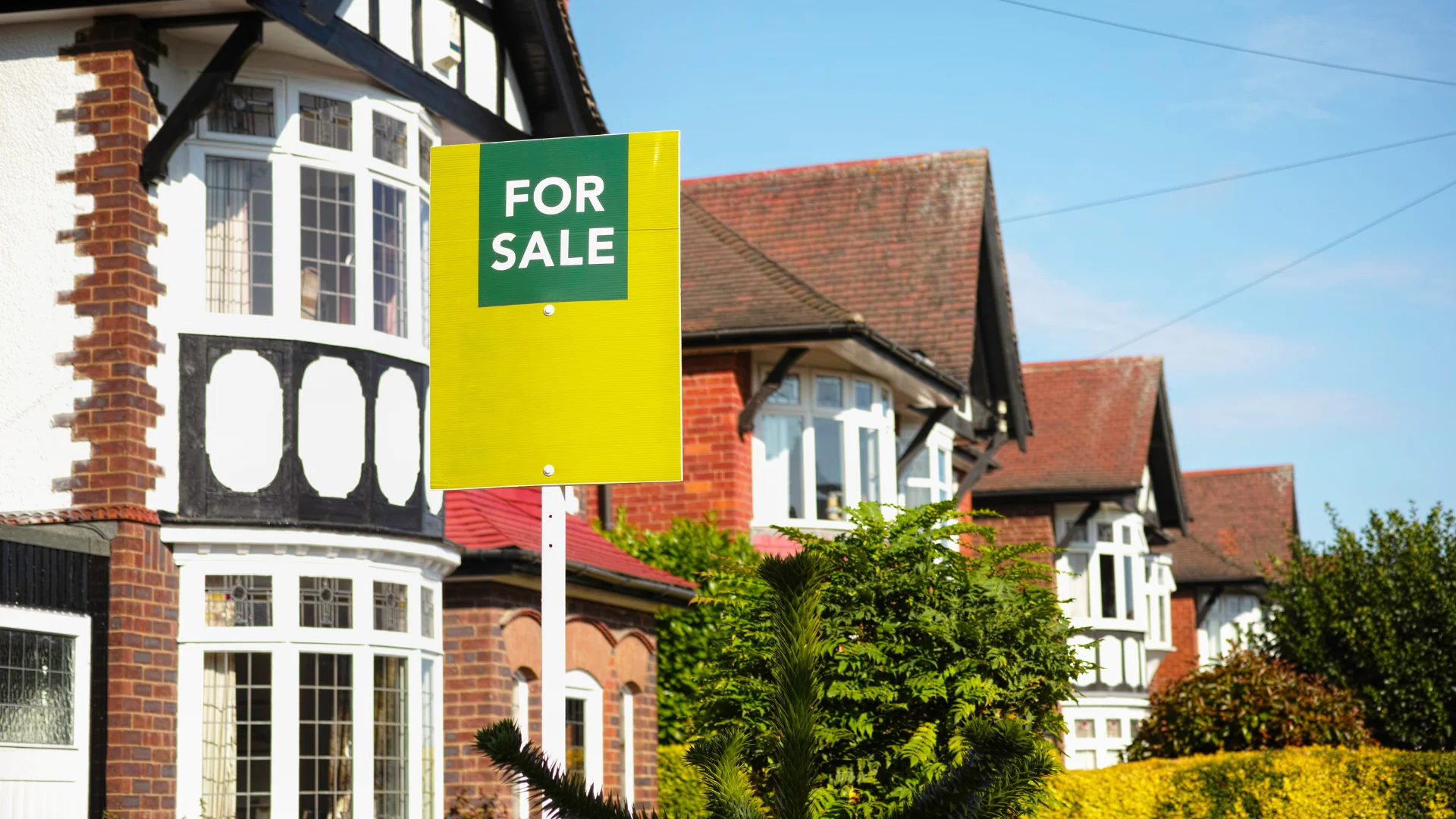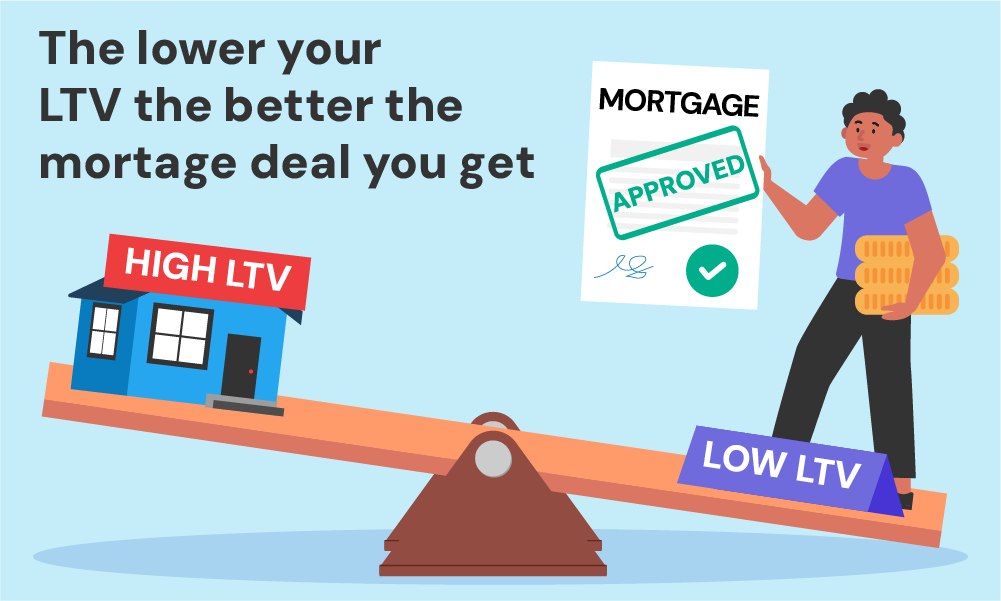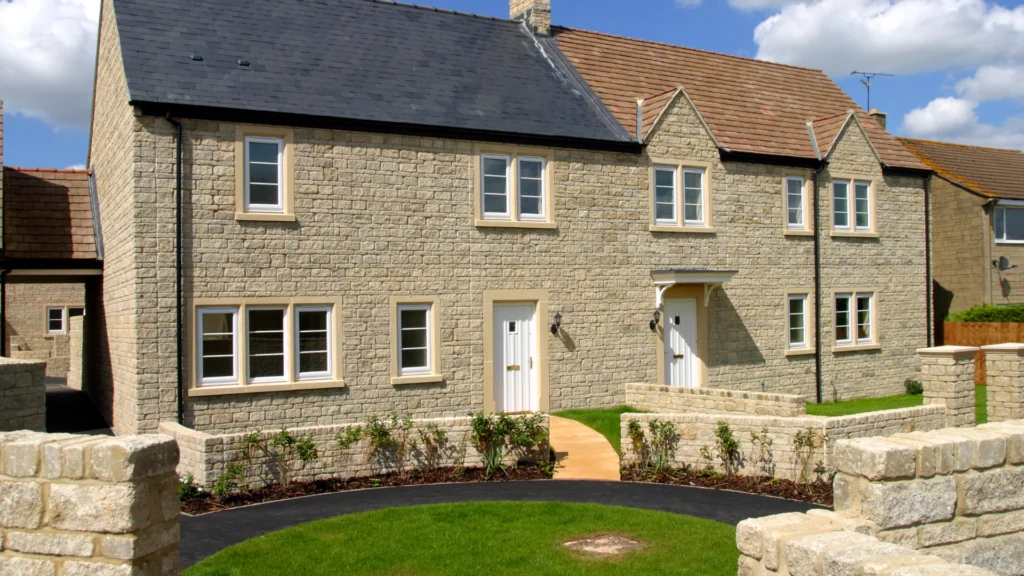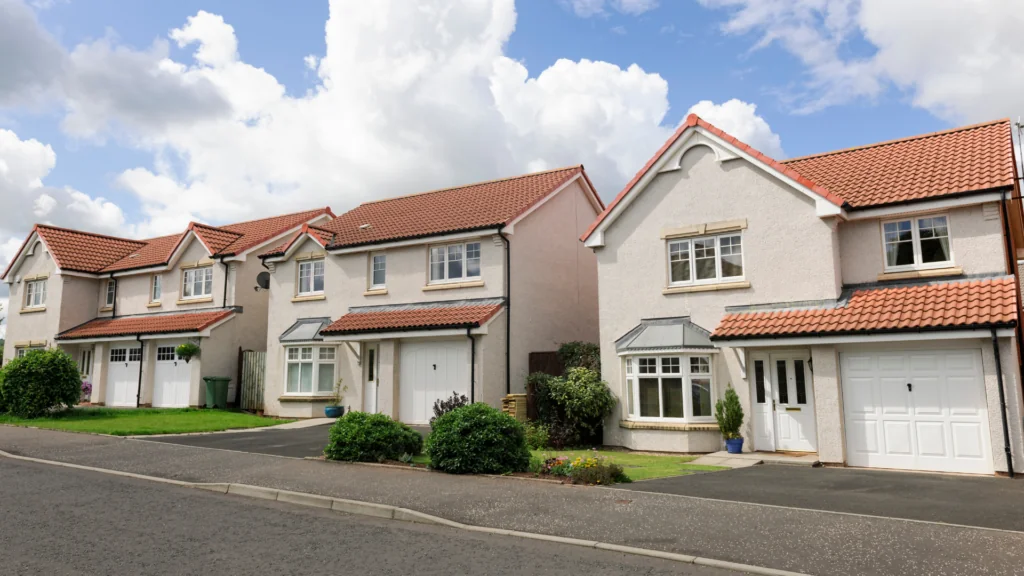- How Much Does a £300,000 Mortgage Cost Each Month?
- How Interest Rates Influence Your Mortgage Repayments
- Whatâs the Difference Between Interest-Only and Repayment Mortgages?
- Who Can Afford a £300K Mortgage?
- How Much Deposit Do You Need for a £300K Mortgage?
- What Affects My 300k Mortgage Monthly Payment?
- Additional Costs to Keep in Mind
- How To Get a £300,000 Mortgage?
- Key Takeaways
- The Bottom Line: How Do I Get The Best Mortgage Deal?
How Much Will You Pay on a £300,000 Mortgage?

You’ve done the maths, and £300,000 seems like the right figure to get the kind of property you want, whether it’s a first home or a place to put down roots for the long term.
But what does that mean for your monthly budget? Before diving into the mortgage process, it’s important to know how the repayments stack up and what factors can affect those numbers.
Let’s break down the details so you can get a clear picture of how to plan your payments without stretching yourself too thin.
How Much Does a £300,000 Mortgage Cost Each Month?
The burning question—how much will I pay? Well, that depends on a few things: the length of your mortgage term, the interest rate you secure, and whether you’re paying off just the interest or both the interest and the principal.
For a typical 25-year mortgage term with an interest rate of around 5%, you’re looking at monthly repayments of about £1,754. That’s on a capital repayment mortgage, where you’re gradually paying off the loan and interest.
But keep in mind, the shorter the term, the higher your monthly payments—but you’ll pay less overall.
A longer term might give you a bit of breathing space each month, but it’ll cost you more in the long run.
Here’s an overview of how interest rates and mortgage terms affect your repayments:
| Terms (years) | 2% Rate | 3% Rate | 4% Rate | 5% Rate | 6% Rate |
|---|---|---|---|---|---|
| 5 years | 525.83 | 539.06 | 552.5 | 566.14 | 579.98 |
| 10 years | 276.04 | 289.68 | 303.74 | 318.2 | 333.06 |
| 15 years | 193.05 | 207.17 | 221.91 | 237.24 | 253.16 |
| 20 years | 151.77 | 166.38 | 181.79 | 197.99 | 214.93 |
| 25 years | 127.16 | 142.26 | 158.35 | 175.38 | 193.29 |
How do you figure out your own mortgage on £300k? Use a mortgage repayment calculator to work out mortgage repayments for different scenarios.
You can tweak the numbers to see how changes in interest rates or mortgage terms affect your monthly payment.
How Interest Rates Influence Your Mortgage Repayments
As you can see from the table earlier, the higher the interest rate, the more you’ll be paying each month. Even small changes in interest rates can have a noticeable impact on your 300k mortgage monthly payment in the UK.
Currently, interest rates are around 5% or more, but even a slight drop could lower your payments. On the flip side, if rates go up, your monthly repayments will increase as well.
This is why you might consider a fixed-rate mortgage—it locks in your interest rate for a set period, giving you peace of mind and stability in your monthly budget.
If you’re okay with a bit more risk, you could opt for a variable or tracker mortgage. These follow the Bank of England’s base rate, so your payments could fluctuate depending on market conditions.
If you’re unsure which option is best for your situation, a good broker can help guide you to the right choice.

What’s the Difference Between Interest-Only and Repayment Mortgages?
When it comes to mortgages, you’ve got two main options: interest-only or capital repayment.
Each has its pros and cons, and your choice will have a big impact on your mortgage repayments on £300,000.
- Interest-only mortgage. With this option, you’re only paying off the interest each month, so your payments will be lower.But here’s the catch—you’ll still owe the full £300,000 at the end of the term. For example, with a 5% interest rate, you’ll pay £1,250 a month, but the £300k will need to be repaid when the term ends.
- Capital repayment mortgage. This is the more traditional route, where your monthly payments go towards both the interest and the loan itself. Over time, you’re gradually chipping away at that £300,000, and by the end of the term, you’ll own your property outright.
The choice between these two often comes down to your financial situation and long-term goals.
If you’re thinking of buying to let or your budget’s a bit tighter at the moment, interest-only might be a good short-term solution.
But if you’re in it for the long haul and want to fully own your home by the end of the mortgage term, capital repayment is usually the way to go.
Image
Who Can Afford a £300K Mortgage?
To afford a £300,000 mortgage, you’d need to earn between £66,000 and £75,000 a year.
Lenders typically allow you to borrow 4 to 4.5 times your annual income.
If that sounds high, remember there are ways to increase your borrowing power.
If you’re buying with a partner, you can combine your incomes. Some professions, like law or medicine, might even allow lenders to offer you 5 or 6 times your income.
To get an idea of what you might be able to borrow, use a mortgage affordability calculator.
Image
How Much Deposit Do You Need for a £300K Mortgage?
Generally, the more you can put down, the better your deal will be.
For a £300,000 mortgage, most lenders will ask for a deposit of 5% to 10% of the property’s value. That means you’ll need between £15,000 and £30,000 upfront to get started.
The size of your deposit affects your loan-to-value (LTV) ratio. The lower your LTV (meaning the higher your deposit), the better the interest rates and monthly repayments you can get.
In the UK, the best mortgage deals are often available when your LTV is 75% or lower—so a deposit of 25% or more is ideal for securing the top rates.
But don’t worry if you can only manage 5%—that’s still enough to get your foot on the property ladder.
Want to see how your deposit affects your LTV? Use an LTV calculator to get a clearer picture of what you’ll need and how it impacts your mortgage.

What Affects My 300k Mortgage Monthly Payment?
It’s not just about plugging in numbers—several factors impact your £300,000 mortgage repayments, and knowing them can help you get the best deal.
- Credit Score. If your credit history is a bit shaky, lenders may charge higher interest rates to cover the risk. Keeping your credit score in good shape can help you get better rates and save money each month.
- Fixed vs. Variable Rates. A fixed-rate mortgage keeps your payments the same for a set period, making it easier to budget. A variable or tracker mortgage, however, changes with the Bank of England base rate, so your payments could go up or down. Think about which option fits your financial situation best.
- Employment Status. Lenders usually prefer borrowers with stable, full-time jobs. If you’re self-employed, on a contract, or have irregular income, you might need extra documents to prove income stability. Some lenders may also charge higher rates for less stable employment.
- Property Type. The type of property you buy can influence your rate. Non-standard properties, like flats above shops or older listed buildings, are often seen as riskier by lenders, which can lead to higher interest rates.
Additional Costs to Keep in Mind
Don’t forget about the extra costs—they’re all part of the mortgage process. When you’re thinking about that £300,000 mortgage, make sure to budget for these additional fees:
- Arrangement Fees. Setting up a mortgage can cost between £1,000 and £2,000, depending on the lender. Some lenders let you add this to your mortgage, but remember, you’ll pay interest on it if you do.
- Valuation Fees. Lenders will carry out a valuation to check the property’s worth. This could set you back anywhere between £250 and £1,500, depending on the property type and location.
- Stamp Duty. If you’re a first-time buyer, you could pay less or even nothing in stamp duty. But if you’re not, stamp duty can range from £2,500 to £5,000, depending on the property price and if it’s your main home or a second property.
- Legal Fees (Conveyancing). Hiring a solicitor or conveyancer to handle all the legal work can cost anywhere from £800 to £2,000.
- Survey Fees. A property survey checks for any structural issues. A basic survey can cost around £250 to £400, while a more detailed one might run you between £500 and £1,000.
- Broker Fees. If you use a mortgage broker, they may charge a fee. This is typically between £500 and £1,500, although some brokers are free and take a commission from lenders instead.
- Insurance. Home insurance is essential to protect your property, and you’ll also want to consider life insurance to cover the mortgage in case anything happens to you. These can range from £200 to £1,000 per year, depending on the level of coverage.
Make sure to factor these costs in early on, so there are no surprises later.
How To Get a £300,000 Mortgage?
The first step is making sure you meet the lender’s criteria. This includes having a decent credit score, enough income to support the loan, and a deposit (5% minimum, remember?).
If you’ve got these covered, you’re already halfway there.
Next up—decide whether you want a fixed-rate mortgage (for predictable payments) or a variable rate (where payments can go up or down).
Not sure? That’s where a qualified mortgage broker comes in. They can help you find the best deal for your circumstances and guide you through the application process.
Once you’ve got your ducks in a row, you’ll need to gather all the necessary documents—proof of income, bank statements, personal ID, and so on.
Your broker will help you with this, making sure everything’s in order before you submit your application.
And that’s it. If you want a step-by-step breakdown of the entire mortgage application process, be sure to check out our full guide.
Key Takeaways
- Monthly repayments for a £300,000 mortgage at 5% interest over 25 years are around £1,754.
- To afford a £300,000 mortgage, you’ll need an income between £66,000 and £75,000, based on typical lender income multiples.
- A 5% to 10% deposit is standard, but a larger deposit lowers your loan-to-value (LTV) ratio, helping you secure better rates.
- Be prepared for extra fees, such as arrangement fees, valuation fees , stamp duty, and legal fees, among others.
The Bottom Line: How Do I Get The Best Mortgage Deal?
Finding the best mortgage deal is not easy. It takes planning, research, and a fair bit of time.
And if you’re someone who isn’t clued up on the mortgage market or doesn’t have the time to dig through the options, you could end up with the wrong deal.
In fact, over a million British households are on the wrong mortgage deal because they didn’t have the right guidance or weren’t aware of better options.
That’s why it’s a smart idea to speak to a qualified mortgage broker to kick off your mortgage journey.
Here’s what exactly they can do for you:
- Search the whole mortgage market to find the best deal tailored to your needs.
- Explain all the complicated mortgage terms into simple terms, so you’ll know exactly what you’re signing up for.
- Handle all the paperwork, so you won’t have to worry about missing anything.
- Negotiate with lenders to secure the best possible terms—taking the stress off your plate.
If any tricky financial situations pop up, they’ll guide you through, making sure everything stays on track.
In the end, they’ll make sure you walk away with the best mortgage deal available, without the hassle.
All you need to do is, get started here. And we’ll put you in touch with a reliable mortgage broker who can help you make the right decision for your mortgage.
Get Matched With Your Dream Mortgage Advisor...

Frequently asked questions
How much do I need to earn to afford a £300,000 mortgage?
To afford a £300,000 mortgage, most lenders will expect your household income to be between £66,000 and £75,000, though some might accept less if you have a large deposit or good credit.
Which is better a fixed or variable mortgage rates?
It depends. Fixed rates give you stability—you know what you’ll pay each month. But with variable (tracker) rates, your payments could go up or down depending on interest rates. A good mortgage broker can help you decide which is best for your situation.
Can I get a mortgage on 300k with a 5% deposit?
Yes, a 5% deposit on a £300,000 mortgage means you’ll need £15,000 upfront, but your monthly payments will be higher compared to a 10% deposit.
What extra fees should I budget for with a £300,000 mortgage?
Be prepared for arrangement fees, valuation fees, legal fees, and possibly stamp duty. These can range from a few hundred to several thousand pounds, so make sure you budget for them.
Can I get a 300,000 mortgage even with bad credit?
Yes, you can still get a £300,000 mortgage with bad credit, but it may be more challenging.
Lenders will likely view you as a higher risk, so they may require a larger deposit (typically around 20-25%) and offer higher interest rates. But, some specialist lenders cater to people with poor credit histories.
To improve your chances, consider:
- Saving for a larger deposit to reduce the loan-to-value (LTV) ratio.
- Working with a mortgage broker who specialises in bad credit mortgages and can find lenders more willing to work with your situation.
- Improving your credit score over time by paying off existing debts and avoiding further credit issues.




